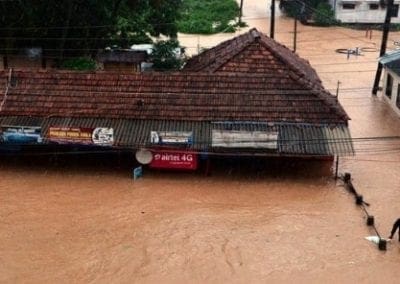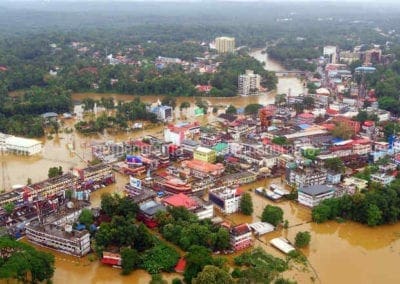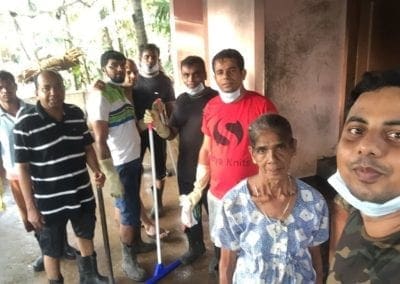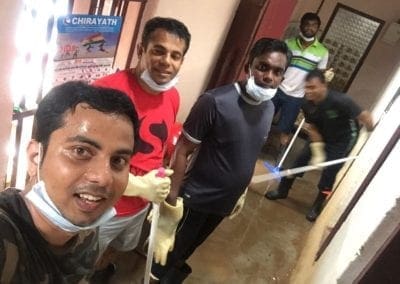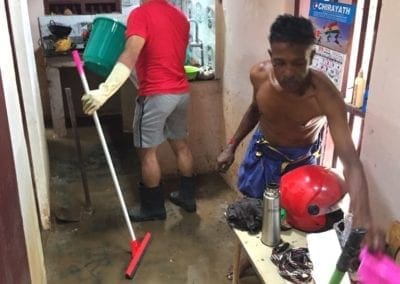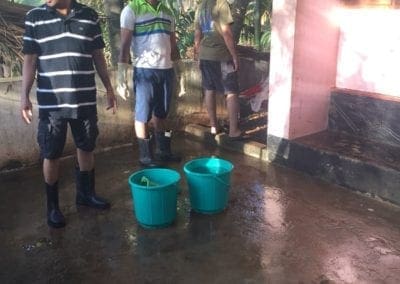The Word of God is alive and active until the end of time. The Word of God tells us something to tell about the past; it speaks to us in the present and it has a message for the future. I believe that everyone who has read the Scriptures is aware of the natural disaster of the flood that took place during the lifetime of Noah. I believe also that most are aware of the floods that took place in the southern part of India, in the state of Kerala and at Kodag, a part of Karnataka. Government officials have declared it one of the worst natural calamities that struck the people of Kerala since 1924. The raging water for all practical purposes submerged the whole of Kerala. Many people were evacuated to relief centers and it should be recalled that all happened occurred in the passing of just one week. The causes are many and the reasons are numerous. However in this article I would like to reflect on what the Word of God tells with regard to such a natural calamity.
Let me begin my reflection by analyzing an image that the regional newspapers and social media published on August 16th, 2018. The image depicts a middle-aged man sitting on the top of his thatched house … most of his house was under water. His facial expression revealed the fact that he was overwhelmed and heartbroken. In fact his face spoke louder than he could ever speak. The newspaper explained that he was asked to move to the relief center in order to save his life. The poor man decided to remain in his house because that house held a special value. He worked his whole life in order to provide shelter for his wife and children. That house was not a mere building but rather it represented the sweat and the blood of a lifetime. Therefore, he decided to remain for as long as there was just a little bit of hope. Jesus said I am giving you my Body to eat and my Blood to drink, and none of us understood how painful it was for Jesus to give us His Body and Blood. In the Garden of Gethsemane blood poured down Jesus’ forehead, blood that was poured forth out of love for humanity. Yet so few people understood that gesture of love and that includes the Apostles whom he chose to continue his mission on earth. Only when my sweat and blood find themselves in a dangerous situation do I begin to realize the pain of losing all of this. In other words, I begin to feel the need of prayer only when I am confronted with a crisis. In this context, the Word of God reminds us that we are all creatures of God. The many years of catechism classes and liturgical instructions, homilies, etc. have, indeed, made us aware of the fact that we are creatures of God. Life experience teaches us much more than any theory. There are times we might be tempted to say to ourselves that we are like the creator and therefore, not a creature. Standing, however, in front of a demolished house after the flood has receded, we find it easy to affirm that we are mere creatures of God. That realization should help us to develop the Christian virtue of humility. We should be able to humble ourselves before the Lord so as to know that bending our knees before the Almighty is the first step in our spiritual growth. The virtue of humility is very familiar to all Vincentians who view that virtue as the mother of all virtues. Therefore I believe that the Word of God speaks to us at this time of disaster and is exhorting us to develop the virtue of humility.
The Word of God continues to speak to us in various ways. The second message that we receive from the Word is about developing a sense of Christian solidarity, a sense of oneness. Once we realize that we are creatures of God then we should also begin to realize that everyone around us is also the same, that is, a creature of God. This realization should help us to attain the social nature which Jesus expects from us. We are basically social beings but many of us fail to express the social dimension in our life. We seem to withdraw into ourselves rather than extend a hand to our sisters and brothers. himself than reaching out himself to everyone. Let me share with you a few lines of a poem that I wrote in regard to the present situation;
I was surprised to hear about the flood happening around me,
My eyes were anxious to see what the flood looked like?
I rushed out of my house in anxiety to see what was happening out in the world?
I found the raging water submerging the land,
I found big bridges being carried away by the ferocious river …
And I took some photographs
I continued to walk and I found that mountain slides had destroyed many homes,
And I took some more photographs
I continued to walk and at the end of the day I returned home
and found my house completely submerged in water,
Only then it became a tragedy for me!
Very often we label something as tragic only when it affects us. The Word of God invites us to affirm once again the reality everyone is created in the image and likeness of God. We are called to respect everyone and to love everyone in the same way that we respect and love ourselves. This natural disaster has reminded us once again about the need to continue to develop the Christian virtue of humility and to deepen the bonds solidarity. Only when we read the Word of God from the perspective of the signs of time do we become better members of the worldwide Vincentian Family and human being. God bless.
Fr. Libin P. Varghese, CM
Dean of Academics
De Paul International School, Mysore
Edited:
Charles Plock, CM
Eastern Province, USA
